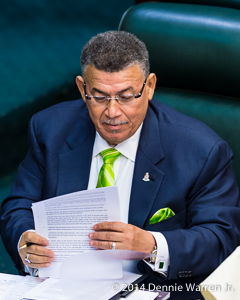Archive for June 12th, 2014

Cops turfed out of HQ over termites
(CNS): Several units of the RCIPS will be relocating from the police headquarters in Elizabethan Square, on Shedden Road, George Town, Friday as a result of an infestation of termites. The offices in Montpelier Properties are undergoing a fumigation process, which means police management, finance and human resources departments as well as the Financial Crime Unit (FCU) have been asked to leave the building. Police bosses and support staff are moving to George Town Police Station, while finance and HR will be re located in a separate building on the Elizabethan Square complex. The FCU, meanwhile, will be moving to the main Government Administrative Building.
Police said that the landlord has asked them to vacate the premises by 4pm on Friday, 13 June and it won’t be safe for police and civilian staff to return until after the proper safety assessments are done after the fumigation. A police spokesperson said that building works will commence shortly after the fumigation finishes, which will continue impacting the Police HQ, including the commissioner's offices and staff, as well as finance and human resources.
Despite the move, the RCIPS said they will ensure that there is no disruption to services provided by the relevant police units and departments.
All existing telephone numbers will be working as normal and anyone wishing to contact any member of staff should continue to use the designated numbers on the RCIPS website or call 949-4222, or email rcipsinfo@gov.ky.
From Friday evening the Financial Crime Unit will be operating from the Government Administration Building on Elgin Avenue and can be contacted on 949-8797. The Finance and Human Resources will be located at Bodden House, Elizabethan Square on 244-2960 and 244-2900. The Commissioner and Deputy Commissioners of Police and their secretary will be at GTPS on 244-2900 and 244-2964. The FOI manger can be contacted on 244-2900.

Petition to keep teacher approaches 500 names
 (CNS): Just one week after CNS revealed that a popular teacher had lost her job from a local school because she is having a baby and is not married to her partner, a petition asking the school board to reconsider that decision has reach almost 500 signatures. Many parents raised their concerns that Bryony Platt, a well-liked experienced member of staff who has been at the school several years, would not be returning for the next academic term because of issues in her personal life and nothing to do with her competency as a teacher. Parents and supporters of Platt commented extensively on CNS in support as well as on the petition site.
(CNS): Just one week after CNS revealed that a popular teacher had lost her job from a local school because she is having a baby and is not married to her partner, a petition asking the school board to reconsider that decision has reach almost 500 signatures. Many parents raised their concerns that Bryony Platt, a well-liked experienced member of staff who has been at the school several years, would not be returning for the next academic term because of issues in her personal life and nothing to do with her competency as a teacher. Parents and supporters of Platt commented extensively on CNS in support as well as on the petition site.
Since the report was posted last Thursday more than 300 people commented on CNS about the issue. Although most were in support of Platt, some commenters agreed with the decision.
However, although she was on contract at a private school, the decision not to renew her employment, depending on the original terms of her contract, may fall foul of the gender discrimination law.
Related article on CNS:
Popular-teacher-loses-job-over-pregnancy

East End farm land project will take time
 (CNS): The minister with responsibility for farm land has revealed that the goal to offer local people access to land on the old prison farm site in East End will take some time. Kurt Tibbetts told finance committee earlier this week that a paper was due to go before Cabinet and the individuals serving on the committee have been tasked with identifying the various steps that will need to be taken to create the application process but he could not say how long it would be before gardeners and farmers would get access to the land as a result of the magnitude of the project.
(CNS): The minister with responsibility for farm land has revealed that the goal to offer local people access to land on the old prison farm site in East End will take some time. Kurt Tibbetts told finance committee earlier this week that a paper was due to go before Cabinet and the individuals serving on the committee have been tasked with identifying the various steps that will need to be taken to create the application process but he could not say how long it would be before gardeners and farmers would get access to the land as a result of the magnitude of the project.
He said lands and survey had begun work on assessing the fixed boundaries but the lay of the land may take government some time to work out the best way forward for its use.
Answering questions about the newly proposed idea to break the former prison farm land into lots that can be leased by local growers and farmers, by East End member Arden McLean, Tibbetts also took a list from the independent member with some 36 of his constituents who have already expressed an interest in using the land.
He said he was not able to say how soon things would happen but as a policy the government wished to achieve and with the necessary resources it would do it as expeditiously as possible. He said people would be utilizing the land long before the end of the current administration. Tibbetts said the committee would in the end determine the acreage and type of farming that can happen on the different plots as he pointed out the land was not uniform and it would suit different needs.

Teacher charged in sex crimes
(CNS) Updated: A teacher from a local government school charged with a catalogue of serious sexual and child abuse offences has been remanded in custody by a magistrate after appearing in court Thursday. Delroy Anthony James (33) was arrested last December, though no information on the case has previously been made public. He has been charged with three counts of indecent assault, three of gross indecency, five counts of child cruelty and one count of attempted indecent assault, as well as possession of an indecent photograph of a child, all involving three boys from the school. The teacher, who is currently suspended from duty, will next appear in Grand Court on Friday 20 June.

CIG makes start on changes to local HIV policy
(CNS): Government is working on changing its policy with regards education about and managing the treatment and care of those living with HIV. A two-day HIV/AIDS workshop was held last week at the hospital which included local medical professionals, government staff, NGO’s, and private sector groups facilitated by Nicola Taylor from the Pan American Health Organization (PAHO). The goal of the workshop was to revise the existing policy in order to bring it in line with the international conventions and treaties, and to ensure its operational plans are developed to align with the local national health policy and plan. Currently there are 76 people living with HIV in Cayman.
In his opening remarks to the conference the health minister Osbourne Bodden said the low rates in Cayman may not paint a true picture of the prevalence of the illness.
“While our HIV and AIDS numbers remain low, we must be reminded that because of stigmatisation, many persons do not get tested and therefore this could result in under reporting,” he warned. “As of March 2014 there were a total of 117 reported cases of HIV since the first case was diagnosed in 1985, 68 of these developed AIDS with 41 AIDS related deaths,” he said as he revealed the current number of 76 people living with HIV locally.
Subjects discussed at the workshop included the epidemiology of HIV here in Cayman, care and treatment, as well as policy, legislation and a broad scope of related topics. The group also revisited recommendations from a report entitled: A Situation Analysis of HIV/STIs in the Cayman Islands 1985-2010. Ministry of Health Chief Officer Jennifer Ahearn as well as the Medical Officer of Health Dr Kiran Kumar and other stakeholders discussed the recommended changes to the existing policy and need to develop an operational plan for the HIV and AIDS programme.
The Ministry and its stakeholders remain committed to reducing HIV vulnerability in the Cayman Islands and ensuring that the country utilises a rights-based approach in its treatment of HIV/AIDS patients.

Welfare vouchers to be replaced by card system
 (CNS): Caymanians receiving government assistances via the Needs Assessment Unit (NAU) are to get pre-paid cards to purchase food and supplies instead of vouchers. The cards will be provided by local supermarkets on Grand Cayman as part of ongoing changes at the NAU to provide a more efficient service to its clients, officials said. With the rising cost of living, declining salaries and ongoing local unemployment, there has been an increase in the number of families forced to seek assistance from the NAU and the unit wants to help more people more quickly. Each pre-paid card will be specific to an identified client and balances can be tracked, reducing the risk to the public purse if they are lost or stolen, officials added.
(CNS): Caymanians receiving government assistances via the Needs Assessment Unit (NAU) are to get pre-paid cards to purchase food and supplies instead of vouchers. The cards will be provided by local supermarkets on Grand Cayman as part of ongoing changes at the NAU to provide a more efficient service to its clients, officials said. With the rising cost of living, declining salaries and ongoing local unemployment, there has been an increase in the number of families forced to seek assistance from the NAU and the unit wants to help more people more quickly. Each pre-paid card will be specific to an identified client and balances can be tracked, reducing the risk to the public purse if they are lost or stolen, officials added.
This new method of payment to support families in need will replace the paper vouchers currently being provided. Local vendors will provide the pre-paid cards, which will function like debit cards and NAU clients will still be able to choose their preferred vendor from a list of participating supermarkets. The cards will be topped up electronically and any unused funds will be returned to the department once the service period has expired.
“Each pre-paid card is specific to the identified client and the balance on each card can be tracked. This reduces the risk of loss of funds due to the card being lost or stolen,” the NAU said in a release, adding that the pre-paid cards will be distributed to clients within the coming weeks. Until then, vouchers will continue to be used.
“The introduction of the pre-paid cards does not affect the provision of services as it pertains to eligibility and the amount provided,” the officials stated.

Government commits to tackle travel scandal
 (CNS): The premier has said that the Progressives-led government will be working with the deputy governor to implement recommendations made by Auditor General Alastair Swarbrick in his recent damning report about the potential misuse of government funds for travel and hospitality by both the elected and administrative arms of government during the previous government. Alden McLaughlin has said that in addition to the introduction of a formal travel policy, the government would continue to report reasons and costs for travel and ensure accountability. Deputy Governor Franz Manderson also acknowledged the deficiencies in government raised by Swarbrick’s report but said the new travel policy was a significant step towards addressing the shortcomings.
(CNS): The premier has said that the Progressives-led government will be working with the deputy governor to implement recommendations made by Auditor General Alastair Swarbrick in his recent damning report about the potential misuse of government funds for travel and hospitality by both the elected and administrative arms of government during the previous government. Alden McLaughlin has said that in addition to the introduction of a formal travel policy, the government would continue to report reasons and costs for travel and ensure accountability. Deputy Governor Franz Manderson also acknowledged the deficiencies in government raised by Swarbrick’s report but said the new travel policy was a significant step towards addressing the shortcomings.
The Office of the Auditor General's report found that at least $8.6 million, and very possibly more than $10 million, of public money was spent on travel and hospitality over a three year period during the UDP administration. However, McLaughlin said the new travel policy implemented in July 2013 sets out rules and criteria for all civil servants and his government had readily adopted the policy for politicians, who were now traveling under its guidelines.
“My government is committed to good governance practices, transparency and accountability as well as prudent financial practices in seeing that the public’s money is spent only when it is absolutely necessary,” McLaughlin stated in a short release from his office following the report’s publication. “We have made it a habit to report to the public on the achievements, outcomes and costs of all overseas travel incurred by this administration.”
In his formal response to the report, Manderson said that the new travel policy was developed after careful consideration of best practice and in consultation with senior leaders across the service, including finance and audit personnel. The policy seeks to avoid risks of travel advances being written off by severely limiting them and relying instead upon prescribed per diems.
“The policy provides uniform guidelines to minimize the range of risks identified in this report. This policy will be monitored for compliance,” he added.
Acknowledging the inherent risks associated with this sort of spending, the deputy governor said the policy tried to strike a balance by providing cost-effective controls which manage the identified risks.
He said that expenditures on Christmas functions have now been harmonised with a central budget for $25 per head. In the management response to each of the OAG's recommendations, the deputy governor indicated that government would be introducing a government-wide hospitality policy.
In light of Swarbrick's findings that staff were signing off and clearing travel and hospitality bills outside the parameters of the law, Manderson said that chief officers and chief financial officers, who are already expected to possess a sound understanding of their roles and responsibilities, will be receive further training to ensure continuing education on the “nuances of these responsibilities within the context of the evolving nature of the policies, laws and regulations”.
See report below

Mac: Report a deliberate ploy
 (CNS): Answering implied allegations that he was responsible for a large part of what could be as much as $10 million of public funds spent on travel and hospitality when he was premier, McKeeva Bush has defended the costs and said the recent report by the auditor general is a distraction. He said that the release, at a time when government is taking a bashing over the budget in Finance Committee and the governor’s office over the Tempura fiasco, is a deliberate attempt to draw attention away from those issues and try him in the court of public opinion. Bush said every trip he took was for the business of the country and the auditor’s report had "more holes than a sieve". Photo Dennie Warren Jr.
(CNS): Answering implied allegations that he was responsible for a large part of what could be as much as $10 million of public funds spent on travel and hospitality when he was premier, McKeeva Bush has defended the costs and said the recent report by the auditor general is a distraction. He said that the release, at a time when government is taking a bashing over the budget in Finance Committee and the governor’s office over the Tempura fiasco, is a deliberate attempt to draw attention away from those issues and try him in the court of public opinion. Bush said every trip he took was for the business of the country and the auditor’s report had "more holes than a sieve". Photo Dennie Warren Jr.
Speaking on Rooster’s early morning radio phone-in show, Crosstalk, on Wednesday, the former premier and now leader of the opposition attacked the auditor general, Alastair Swarbrick. As he has before, Bush described the government’s auditor as the former governor’s "hit-man", as he defended the cash spent on trips and entertainment when he was premier, claiming he had to “hustle” on behalf of the country. With what he described as 14 entities under his responsibility for which he had to go overseas, Bush said he had no choice.
Denying using any limousines or ever being off-duty, as he said he was the premier of the country 24 hours a day, seven days a week, he asked how the auditor expected him to travel and asked if he thought he should have walked. The opposition leader said all he ever asked for when traveling was that he stayed somewhere as comfortable as his own bedroom at home and safe because the government would not pay for a security detail for him.
Bush denied any of the spending was lavish or that there was not a paper trial. He said there were many times he used his own money, or didn’t cash his per diem allowance cheques, and if anything the government owed him money. Bush added, “It’s expensive … you can’t sponge off other people.”
He said in some instances it was not possible to quantify the business case as it was about promoting Cayman, creating business confidence and correcting misconceptions around the globe.
The premier also pointed to a double standard when he said that the auditor did not try and investigate what happened in the Ministry of Tourism during 2005 to 2009, nor has the governor’s office ever been audited. He accused Duncan Taylor of using public cash to support his grown son, who lived at Government House, and the lavish events put on by the governor’s office, which are never criticised.
“They are part of untouchables. I know what they are doing … people know what is going on,” Bush told his hosts on Rooster.
Bush also said that when the Public Accounts Committee, of which he is deputy chair, meets to examine this report in the near future, he will be finding out why the auditor seems to have such trouble finding a paper trail asBush said the statements for the credit cards are very easy to find as they are with the bank. He also noted that he would be asking the finance people in the ministry to tell their side.
The opposition leader said it was not uncommon for everyone to use their government credit card for what they needed and pay it back later. He claimed this practice was not unusual and also common in the private sector. But, he said, whatever he had used it for personally it had been paid back.
He accused Swarbrick of causing the country to lose millions when he had stood in the way of him renegotiating a loan for the public sector, though the paper trail previously presented regarding the Cohen and Co loan has suggested otherwise. Bush said the auditor was part of the new colonial regime and that it was about targeting him.
Related articles on CNS:

Lewd acts in public
I have noted that the response by the general public seem to range from outrage to nonchalance with regards to the lewd acts performed by two of our young people in a nightclub. Neither responses are helpful in charting the course going forward. It is important to bring some analysis to the situation; firstly these two young ladies ought to accept the responsibility for their erroneous actions.
Erroneous only because they have taken an act (sexual act) that is usually reserved for privacy into the public sphere. However, they are not the only persons guilty, as not only did others watched satisfying their voyeuristic curiousity, it also appeared that no efforts were made to disrupt these ladies. Guilty also, are those who chose to publish the pictures bringing them into the public domain. My only contention can only be that this was meant to be malicious or a continued lack of judgment on all those who were involved.
As a person who has worked with youth for several years I have noticed a number of social disabilities trending among some of our youth;
- An inability to distinguish appropriate from inappropriate behaviours
- Disengagement from consequences of behaviour
- Unwillingness to take personal responsibility for their actions
- Lack of empathy
- Inability to problem solve
These are traits that I have noticed not only in those that we often describe as “at risk”, but also sometimes among those we believe are “well adjusted”. In my mind these are critical behaviours that needs continuous attention and support so that our youth can make better decisions. A quick content analysis of some of the responses on CNS also reveals that some sections of the adult population as well seem to be devoid of emotions and compassion, hence some of their callous responses.
So where do we go from here? Firstly, I hope that these young ladies and their family access therapeutic support and are able to get through this incredibly tough time. It is also my wish that young people and their leaders start to engage each other in healthy discussions about decision making especially about what is acceptable versus what is not.
Additionally, there is no denying that policies can be examined to facilitate the protection of youth when they fail to protect themselves. A hand off approach will get us nowhere, I encourage the community to gather not in outrage or a blame game, but to honestly garner support from each other and devise powerfully strategies that could reduce some of these “social disabilities” among our youth discussed above.

Passport delays in UK mount in face of cuts
(CNS): An increased demand and cuts in resources appear to be behind the mounting delays at the UK passport office. Although Cayman has not yet fully repatriated its passport services to the UK, as that happens local passport applications here and in other overseas territories could also be impacted by issues in the UK. The UK’s Home Secretary Theresa May has insisted the government is doing all it can to deal with the backlog of more than 30,000 passport applications which have not been dealt with within the normal three-week deadline. However, the coalition government is facing allegations of not taking control of the situation.
According to the plethora of reports coming from the UK about the issue, as the country moves into the holiday season the HM Passport Office (HMPO) was increasing the number of examiners and call handlers by another 200 on top of the 900 existing staff re-assigned to deal with the highest level of applications for 12 years. New offices are also being opened in Liverpool next week to help tackle the backlog.
The Passport Agency is currently dealing with about 465,000 renewals and first-time passport requests, and 150,000 passports are being sent out each week.
The UK’s opposition Labour party has said that the problem is not just down to increases in application but a reduction of resources. But David Cameron, the British prime minister, said longer opening hours had been introduced at passport offices, which were now operating seven days a week.
"The Home Office has been on this from the very start, but it all begins with 300,000 extra people applying for passports compared with the previous time last year," he said.
Labour says the number of staff at the Identity and Passport Service has fallen by 600 since the coalition came to power in 2010.
Passport Office chief executive Paul Pugh, who will be questioned next week by MPs on the Commons Home Affairs Select Committee, said there had been "exceptional" summer demand but that extra staff had been brought in to handle applications.
"We are operating seven days a week and our couriers are delivering passports within 24 hours of being produced," Pugh said. "We have issued almost three million passports for UK customers in 2014, including over one million issued in the eight weeks since the start of April."
In the past, overseas applications were handled by embassy and consulate officials in seven regional processing centres around the world under the direction of the Foreign Office. But between December 2012 and March this year, responsibility for the application, handling, printing and delivery of overseas passport applications was transferred to the Passport Office in the UK.